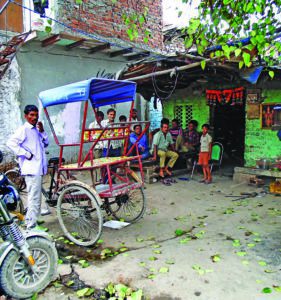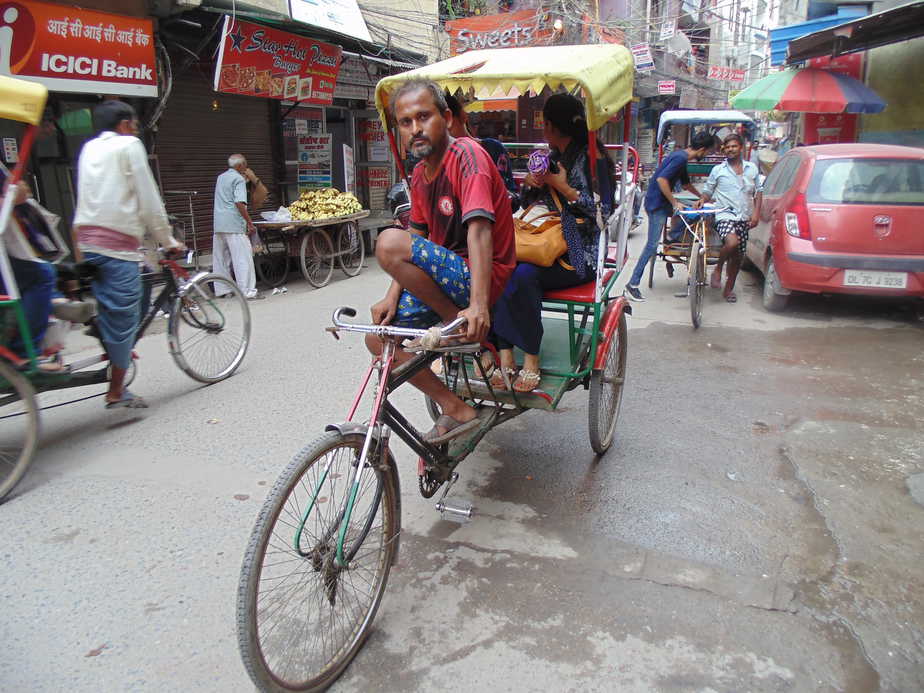The death of a rickshaw puller’s three children highlights the failings of a welfare state that lacks the compassion to tackle a family wracked by alcoholism, mental illness and neglect of kids
The life of rickshaw pullers is anything but easy. Inclement weather does not deter them from lugging a passenger to their destination, not the treacherous heat of Delhi, or the monsoon rains, or the biting cold — not to forget the dusty lanes. But recently it was made even more difficult for Mangal with the theft of his rickshaw — twice.
Kailash, who runs Pankaj rickshaw garage in the Capital’s Mandawali, from where Mangal would hire his rickshaw for R50 everyday, says Mangal was an alcoholic. “If you’re constantly drinking and falling asleep anywhere outside, on the road, then how won’t your rickshaw get stolen?” he asks.

He says when it first happened, he had decided to give Mangal another chance. “I could not hit him nor do anything. He would plead and say I need money to feed my kids, so I just gave him another one”. But then almost two weeks later, Kailash tells Patriot, Mangal said his rickshaw was stolen yet again. “This time I just asked him to leave. How can I keep helping someone? I am losing money as well and he would do it again because of his drinking”. He went on to tell us that with rickshaws being easy to dismember, and with drinking being a real problem in their area, many people and their rickshaws had met the same fate.
According to Kailash, Mangal would turn up after three or four days sometimes with the rent money, saying he had slept off somewhere. Sometimes his children would come enquiring about their father who hadn’t been home in days. “The girls were so lovely, the eldest was tall and the youngest was so small. But Mangal didn’t look after them. How could he just leave them for days like that?” he asks, questioning the man’s love for his children.
Mangal is the father of the three young girls who died of hunger in Mandawali. He has not been traced yet. Hailing from West Bengal, he had lost his dhaba business in Delhi four years ago, when his eldest daughter must have been four, and his second daughter, Shikha, just born.
This month, at the time of death of the two sisters and a third, who was two years old, Mangal was working as a rickshaw puller.
Fellow rickshaw pullers, when asked about Mangal’s wife, say that she didn’t look quite okay. “If she was, she would have gone out and worked somewhere, or even begged for food if her children were going hungry, but she did nothing.” Institute of Human Behaviour and Allied Sciences (IHBAS) has now found that the mother of the three, Beena, suffers from an “intellectual disorder” from birth.

Not only was the state unable to provide the family with their fundamental right of food, it has been unable to provide mental health facilities or even promote awareness that would have perhaps changed Beena’s, Mangal’s and especially the three young sisters’ fate.
Journey for work
Many of the rickshaw pullers Patriot interviewed have come to Delhi for “10-15 days”, to earn some money and return to their village. A majority of those from Uttar Pradesh plan on leaving by Raksha Bandhan holiday, and coming back to work in the Capital till harvest time in their village calls them back.
They make on an average R300 per day. Sometimes even less — one man whom we met at 2 pm hadn’t yet got a customer. Making ends meet would be difficult, which is why they leave their families behind to make some money in the city, when their village gives them no opportunity.
Vijay plans on going back home later this month, and then starting work in a rice mill in September where he’ll earn R12,000 per month. Bablu, who has come to Delhi for the first time, from Bareilly, will go back to work on his family’s fields — his father died three years back. He has been in Delhi only three days, but Bablu has already grown to like it. Maybe it is to do with him being an 18-year-old, but also could be that in the village “they make you work too much for too little”, as he says.
Then there’s Gopal, one of the few persons we met, who has been living in Delhi for many years, and has a ration card.
Amongst the men who rent rickshaws from Pankaj garage, and men known to Mangal, none have a ration card. “Who will go through all the struggle and give up days of work? They make you run around, and will send you to 10 people., We don’t want to do it”. They have all given up, and don’t obviously believe in the system. But there are also others who don’t even know of such a provision, like Praveen, who lost his child a few months ago, even as the Anganwadi “madam” said “she was busy and couldn’t come home”.
According to a fact-finding report led by Harsh Mander, former special commissioner to the Supreme Court in the Right to Food case, despite being eligible for a ration card, Mangal and Beena’s family did not have one. It noted that many people got excluded due to insistence on “furnishing ID proof/ address proof and Aadhaar”. It also found, that of the 28 families who lived in the same block where the girls died, “only 1 or 2 families had a ration card”, and “none of the neighbours in the railway colony had ration cards and only 1 rickshaw puller from among the 25 we met possessed a card”.
While the most marginalised and needy are being shunted out from the programme, when you walk through the lanes of Mandawali, you see that the whole area has been forgotten.
Mandawali, which was an unauthorised colony till it was made legal in 2012, has open drains flowing through every street, and dwelling. The drains looked full to the brim, and a little drizzle would cause the already putrid-smelling lanes to be overrun by sewage.
The area is enveloped by house flies and mosquitos, a certain health hazard, especially as Delhi enters the deadly time of mosquito-borne diseases. Deputy Chief Minister Manish Sisodia, who is the MLA representing the area, seems to have forgotten about the people who elected him to power.





